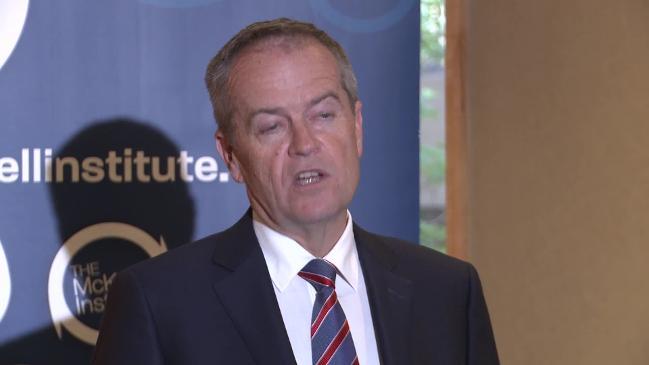Jeff Kennett: Bad business culture means a bad business
THE banking royal commission has brought a sense of betrayal of trust but a bad business culture will always mean a bad business, writes Jeff Kennett.

Opinion
Don't miss out on the headlines from Opinion. Followed categories will be added to My News.
MY FIRST life insurance policy was with AMP, almost 55 years ago. It was a huge, parchment-like policy document. But I have thought of it as the royal commission into our banking and financial services industry has unfolded, bringing with it a real sadness and a sense of betrayal of trust.
That the banks, from whom most of us got loans to buy our first homes, or finance our first business, and AMP, a giant of insurance and financial advice, should provoke such feelings is bitterly disappointing.
I am sure most employees in those institutions are hard-working, honest individuals. But the inescapable fact is that their reputations are being sullied by the actions of some senior office holders and, in the case of AMP, the board itself.
AMP CHAIR FOLLOWS CHIEF OUT THE DOOR
HYSTERIA AROUND BRENNER LIKE A WITCH HUNT
KELLY O’DWYER IN BACKFLIP ON ROYAL COMMISSION
As a society, we are all being pulled down by the failure of some people to apply the highest standards of governance to their responsibilities. I have long believed the salaries of those at the top of such financial institutions are grossly inflated. I often think for instance of the bank’s frontline employees, the tellers, who work consciously for a salary, as opposed to their bosses who are not only paid a far greater salary but also are paid short and long-term bonuses.

The reality is bonuses and incentives, subject to targets, have become the norm and in many industries there is a temptation to stretch or break rules to reach those targets.
That appears to be the case for many before royal commissioner Ken Hayne. We are seeing too much greed, individually and collectively. I suspect it is true that few businesses would come out of a forensic examination with a 100 per cent clean bill of health. And it is true that not all boards know the full details of what is happening within the organisations they lead.
That is why the culture of an organisation is so important and that culture should be driven from the top — a culture based on values and a continuing questioning of management. A board should not be involved in day-to-day operations, but through the culture it sets. As long as management does not surprise the board, most would be reasonably well informed about work practices and that should prevent systematic abuse.
Where abuse does exist, the buck firstly stops with the CEO. Then the board, if they were aware.
As I said before these officers are extremely well remunerated. Where they have instigated, or permitted, bad practices, their base pay should be shredded, their incentives cancelled.
What will be the personal and collective consequences for those the royal commission finds to have deliberately betrayed the trust of their clients, the community or the authorities? Is it sufficient that AMP CEO Craig Meller and now the chair of the board Catherine Brenner have gone? Or should the board members who knew of the behaviour a year ago also be removed?
THERE is now no doubt some of the big organisations which most of us have trusted for years, have acted deliberately against the interests of their clients and customers in pursuit of bigger profits and bonuses.
I feel sorry for the hundreds of people with meagre means who have turned to a financial adviser to assist them manage their affairs to achieve reasonable comfort in retirement only to find that adviser was working to a different drum, meaning the client’s welfare was not the top priority.
How often have we heard of stories of individuals and small businesses who have had their lives or fortunes destroyed by the action of a bank?

I have no doubt the work and findings of this royal commission will change dramatically the way some of these institutions work. But how long will it be before bad practices re-emerge?
Financial penalties and potentially jail sentences will be applied to those in the future who breach rules, regulations and legislation.
But what about the consequences for those whose actions are being exposed by this royal commission?
Of course, many years of successive economic growth has contributed to the pursuit of continuing growth at all costs and the pursuit of high salaries and incentives.
The royal commission is sending a very clear shot across the bows of all organisations. Big and small, publicly listed and private. All boards must examine closely how their businesses are being run and whether any number of state and federal rules and regulations are being met.
One of the consequences of the royal commission is that all good businesses and leaders of those businesses will have to reassess how they operate. I suspect for the majority, the findings will be fine.
For those of dubious or worse behaviour, get your house in order quickly because if you don’t, and are found to be in breach, the penalties deserve to be devastating.
As I have said, we have all been sullied by what has emerged. Our confidence in our institutions has been significantly eroded. The rebuilding of trust will take much longer than the rapid erosion we have experienced.
Greed is a dreadful vice, something that invariably leads to bad practices. It is time to draw a line and ensure good cultures and work practices have the opportunity to flourish.
Have a good day.
Jeff Kennett is a former premier of Victoria


